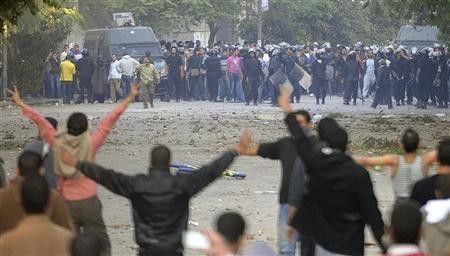Egyptian police battle protesters, 33 dead

Cairo police fought protesters demanding an end to army rule for a third day on Monday and morgue officials said the death toll had risen to 33, with many victims shot in the worst violence since the uprising that toppled President Hosni Mubarak.
Tens of thousands of people packed Tahrir Square, the epicentre of the anti-Mubarak revolt in January and February, as darkness fell, despite the clashes that threaten to disrupt Egypt's first free election in decades, due to start next week.
Protesters have brandished bullet casings in the square, where police moved in with batons and tear gas on Saturday against a protest then dominated by Islamists but since driven by young people with secular aims. Police deny using live fire.
Medical sources at Cairo's main morgue said 33 corpses had been received there since Saturday, most of them with bullet wounds. At least 1,250 people have been wounded, a Health Ministry source said.
I've seen the police beat women my mother's age. I want military rule to end, said protester Mohamed Gamal, 21.
Army generals were feted for their part in easing Mubarak out, but hostility to their rule has hardened since, especially over attempts to set new constitutional principles that would keep the military permanently beyond civilian control.
Police attacked a makeshift hospital in the square after dawn on Monday but were driven back by protesters hurling chunks of concrete from smashed pavements, witnesses said.
Don't go out there, you'll end up martyrs like the others, protesters told people emerging from a metro station at Tahrir Square.
CLOUD OVER ELECTION
The violence casts a pall over the first round of voting in Egypt's staggered and complex election process, which starts on November 28 in Cairo and elsewhere. The army says the polls will go ahead, but the unrest could deter voters in the capital.
In an apparent sop to protesters, the army council issued a law to bar from political life those who work to corrupt political life and damage the interests of the nation.
The announcement was unlikely to satisfy political parties and activists who have called for a blanket ban on former members of Mubarak's now defunct National Democratic Party.
This is a meaningless move by the military council. In fact this is a slap in the face of protesters and those who died to demand freedom and respect, said activist Mohamed Fahmy. The council is out of step with the people.
Some Egyptians, including Islamists who expect to do well in the vote, say the ruling army council may be stirring insecurity to prolong its rule, a charge the military denies.
German Foreign Minister Guido Westerwelle said violence must end. This is quite evidently an attempt to thwart a democratic transition process, he said.
Political uncertainty has gripped Egypt since Mubarak's fall, while sectarian clashes, labour unrest, gas pipeline sabotage and a gaping absence of tourists have paralysed the economy and prompted a widespread yearning for stability.
The state news agency MENA said 63 flights to and from Cairo had been cancelled because of the latest unrest.
The instability could accelerate Egypt's slide toward a currency crisis, forcing a sharp depreciation of the Egyptian pound in the next few months and conceivably prompting Cairo to impose capital controls, analysts said.
Even in advance of recent events we were very concerned about the balance of payments and the burn-through in reserves, said Farouk Soussa, Middle East chief economist at Citigroup. The violence and political noise is going to erode whatever confidence was left in the Egyptian economy, and may result ... in an acceleration of capital outflows.
The military plans to keep its presidential powers until a new constitution is drawn up and a president is elected in late 2012 or early 2013. Protesters want a much swifter transition.
The army said on Monday it had intervened in central Cairo to protect the Interior Ministry, not to clear demonstrators from nearby Tahrir Square, whom it also offered to protect.
The protesters have a right to protest, but we must stand between them and the Interior Ministry, said General Saeed Abbas. The armed forces will continue in their plans for parliamentary elections and securing the vote.
SAME MENTALITY
The Interior Ministry, in charge of a police force widely hated for its heavy-handed tactics in the anti-Mubarak revolt, has been a target for protesters demanding police reform.
Unfortunately the Interior Ministry still deals with protests with the same security mentality as during Mubarak's administration, said military analyst Safwat Zayaat.
The latest street clashes show the depth of frustration, at least in Cairo and some other cities, at the pace of change.
About 5,000 students marched in Alexandria, demanding an end to military trials of civilians and for those responsible for the recent violence to be brought to justice, MENA said.
Military rule is defunct, defunct, crowds chanted in Cairo. Freedom, freedom.
Residents reacted angrily when police fired tear gas into a crowd gathered below a burning building 200 metres (yards) from Tahrir Square, hindering the rescue of trapped residents.
Outside the apartment building, protesters chanted Tantawi burnt it and here are the revolutionaries, referring to Field Marshal Mohamed Hussein Tantawi, Mubarak's defence minister for two decades and leader of the army council.
Doctors in orange vests were treating casualties on pavements in the middle of Tahrir.
Liberal groups are dismayed by the military trials of thousands of civilians and the army's failure to scrap a hated emergency law. Islamists eyeing a strong showing in the next parliament suspect the army wants to curtail their influence.
Analysts say Islamists could win 40 percent of assembly seats, with a big portion going to the Muslim Brotherhood.
© Copyright Thomson Reuters 2024. All rights reserved.




















